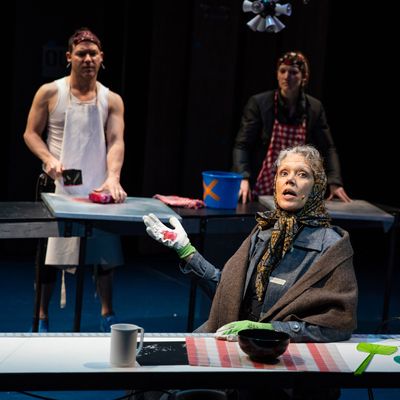
The Wooster Group’s current show The Mother (a learning play) is, by the company’s standards, almost conventional. If you’ve seen its other work — and there have been stacks of it in the last 46 years — you might go in expecting experimental wildness instead of this droll, jazzy, delicately hopeful show. The Group’s transgressive buckaroo spirit seems reined-in here, tamed in service to Bertolt Brecht’s 1932 text, and for a little while, I was actually thrown by how not-thrown I was. It took a few minutes to get acclimated to being … delighted. As I relaxed, though, I finally saw the uncanniness flickering around the edge of the show. Formal experimenters, long-process devotees, deep thinkers — the Woosters never make pieces with clear outlines. In Wooster-land, there’s always a sort of fuzziness around where a show’s boundaries start and stop, and it’s in that intertidal region where its deeper meanings lie.
Director Elizabeth LeCompte’s slow-build, multimedia methodology tends towards the mash-up. She and the Group collide elements — opera and a B-movie, say — or they recreate cinematic effects using lo-fi materials. Artifacts of rehearsal (jokes, asides to technicians) can embed in the production as it progresses, as do revenants of past Group shows, which emerge as ghostly shapes inside the drama. If that prop looks familiar, it might be because it was also in 2017’s The Town Hall Affair, being hurled across the room. A Wooster Experience also includes a swarm of film clips and source material, all suspended in orbit around what’s visible on stage. Some of the theater’s video monitors face the performers and not us. Is all that peripheral, invisible ephemera part of the play? Yes, no, sort of? Certainly not every audience member will encounter everything — most folks will miss the “dailies” (vlogs posted on the Wooster website), and it’s a little gauche to crane around during a show to look at a screen that’s deliberately placed out of view. But whether we see this Oort cloud of material or not, the sensation of an abraded fringe is there. We know the solar system must have an edge, but we also suspect it’s an un-boundary — more a melting and a fading than a hard-drawn line.
While the outer borders of a Wooster Group show feel nebulous, there’s no doubt that The Mother does have a single, bright center. The story revolves around Kate Valk as Pelagea Vlassova, a Russian woman who progresses through Brecht’s episodic plot from ignorance about Communist principles to leadership in the Red cause. The learning-play format is instructional, almost child-simple, because Brecht’s stated purpose was “to teach the spectator a most definitely practical conduct that is intended to change the world.” He therefore structures The Mother as if it’s a how-to manual: First we see the illiterate, unpolitical Vlassova grumbling about the way her son Pavel (Gareth Hobbs) has fallen in with troublemakers and labor organizers. Then we see her helping out with some Marxist pamphlet distribution, just out of concern for her son’s friends (Ari Fliakos and Erin Mullin). Then we see her learning to read in the house of the Teacher (Jim Fletcher), demanding to be taught words like “worker” and “strike.” At first the Teacher is tough to sway (“educated people you can’t convince of anything”), but her manifest passion soon carries him along in her own journey towards the front lines of the workers’ struggle.
The Mother takes place on a stage crowded with rehearsal-room mess: a dozen tables, a hundred stripes of tape, cables criss-crossing through the middle air like clotheslines. Rising up behind the crowd of half-walls and black flats is a huge video screen, which shows an industrial skyline, video-pigeons gliding around eerily without flapping their wings. Actors often lip-sync their text, though Eric Sluyter’s live-mixed audio plays tricks on us, and it can be difficult to tell what’s being spoken live and what’s recorded. Each actor has a different approach to sound: Fliakos is doing a kind of James Cagney rat-a-tat-tat delivery (there’s a Cagney movie playing on one of the hidden video monitors), while Fletcher mutters and laughs under his breath, and Hobbs sits at a small keyboard, accompanying his own speech with jazz punctuation. This mingled recorded-real composition is meticulous, musical. The air is full of Amir ElSaffar’s compositions, and the company itself breaks into song several times, their voices stomping effortfully through Hanns Eisler’s songs in hobnail boots.
LeCompte expands on the play’s didactic mood. Fletcher sometimes speaks to us, pointing out moments when Brecht’s theories of alienation falter around the play’s frequent appeals to sentiment. (These seem to be re-creations of talks by Slavoj Zizek.) For the most part, though, the rudimentary props, like a paint bucket labeled SOUP, and sound structures are Brechtian techniques illuminating a Brecht text. I mean, that guy loved a label. If Brecht had been able to get his hands on microphones like these, this staging would have been the show he’d make. The play and the performance choices are therefore in tune at some deep level, rather than deliberately mismatched as they have been in most Wooster shows. It’s that synchrony that’s delightful, that feels easy, that makes the play a pleasure.
So where’s the strangeness and blurriness? For me it was in the way the show slides, provocatively, across a border into the personal. Fletcher and Valk are a couple in real life, and he murmurs to her, late in the show, that if she’d like to quit, he’s pretty sure he can get something in pilot season. The masks slip; they seem to be themselves for a moment. That tiny gap is enough to glimpse other personal connections that the 60-something Vlassova might have to 60-something Valk, and perhaps even connections to 70-something LeCompte. We are in a time of thinking about revolution and paths forward, and the Woosters spent it meditating on the power of the eldress, the woman with a lot to learn, the matriarch who knows how to do a lot with little. Look at her, the play says over and over, as our focus returns to Valk’s face, lit like the dove in an Annunciation painting. There’s plenty to be distracted by in The Mother, from Fletcher’s sly humor to the set elements whizzing around. But it’s ultimately a production that doesn’t want you to miss the message. Kate Valk is that message. She stands still and looks up to us in the seats, her voice dreamy and cool, her eyes shining like beacons. She is 65, and she has work to do. Follow her.
The Mother is at the Performing Garage through November 20.





